
Incremental reading is a software-assisted method for learning and retaining information from reading, which involves the creation of flashcards out of electronic articles. "Incremental reading" means "reading in portions". Instead of a linear reading of articles one at a time, the method works by keeping a large list of electronic articles or books and reading parts of several articles in each session. The user prioritizes articles in the reading list. During reading, key points of articles are broken up into flashcards, which are then learned and reviewed over an extended period with the help of a spaced repetition algorithm.

Spaced repetition is an evidence-based learning technique that is usually performed with flashcards. Newly introduced and more difficult flashcards are shown more frequently, while older and less difficult flashcards are shown less frequently in order to exploit the psychological spacing effect. The use of spaced repetition has been proven to increase the rate of learning.
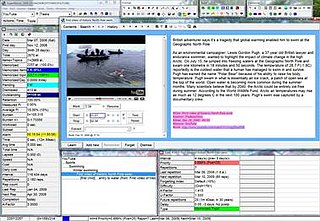
SuperMemo is a learning method and software package developed by SuperMemo World and SuperMemo R&D with Piotr Woźniak in Poland from 1985 to the present. It is based on research into long-term memory, and is a practical application of the spaced repetition learning method that has been proposed for efficient instruction by a number of psychologists as early as in the 1930s.
Computer-assisted language learning (CALL), known as computer-aided instruction (CAI) in British English and computer-aided language instruction (CALI) in American English, Levy briefly defines it as "the exploration and study of computer applications in language teaching and learning." CALL embraces a wide range of information and communications technology "applications and approaches to teaching and learning foreign languages, ranging from the traditional drill-and-practice programs that characterized CALL in the 1960s and 1970s to more recent manifestations of CALL, such as those utilized virtual learning environment and Web-based distance learning. It also extends to the use of corpora and concordancers, interactive whiteboards, computer-mediated communication (CMC), language learning in virtual worlds, and mobile-assisted language learning (MALL).

Rote learning is a memorization technique based on repetition. The method rests on the premise that the recall of repeated material becomes faster the more one repeats it. Some of the alternatives to rote learning include meaningful learning, associative learning, spaced repetition and active learning.
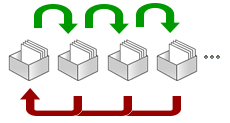
A flashcard or flash card is a card bearing information on both sides, which is intended to be used as an aid in memorization. Each flashcard typically bears a question or definition on one side and an answer or target term on the other. Flashcards are often used to memorize vocabulary, historical dates, formulae or any subject matter that can be learned via a question-and-answer format. Flashcards can be virtual, or physical.
Studying in an educational context refers to the process of gaining mastery of a certain area of information. Study software then is any program which allows students to improve the time they spend thinking about, learning and studying that information.

Mnemosyne is a line of spaced repetition software developed since 2003. Spaced repetition is an evidence-based learning technique that has been shown to increase the rate of memorization.
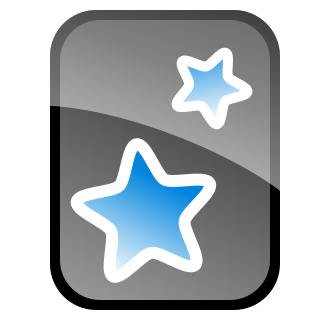
Anki is a free and open-source flashcard program. It uses techniques from cognitive science such as active recall testing and spaced repetition to aid the user in memorization. The name comes from the Japanese word for "memorization".
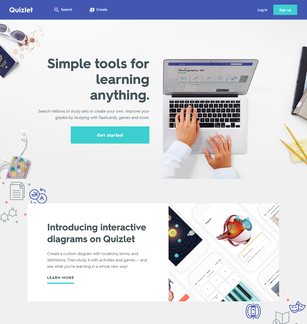
Quizlet is a multi-national American company that provides tools for studying and learning. Quizlet was founded in October 2005 by Andrew Sutherland, who at the time was a 15-year old student, and released to the public in January 2007. Quizlet's primary products include digital flash cards, matching games, practice electronic assessments, and live quizzes. In 2017, 1 in 2 high school students used Quizlet. As of December 2021, Quizlet has over 500 million user-generated flashcard sets and more than 60 million active users.

Koofers was a social media service for college students. It provided academic information sharing. College students hadaccess to the service by creating an account with their e-mail address. Koofers was a private company, founded in 2008 and headquartered in Reston, VA.
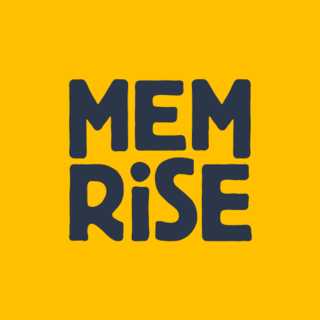
Memrise is a British language platform that uses spaced repetition of flashcards to increase the rate of learning. It is based in London, UK.
StudyBlue was an online studying platform for high school and college students. The website allowed users to upload class study materials, create electronic flashcards to study and share with others, and practice quizzes. StudyBlue allowed students to store their notes in the cloud and connect with other students studying the same subjects. StudyBlue content could be accessed online or on mobile phone applications. The company served students at high schools, community colleges, and universities predominantly in the United States and Canada, but also around the world. Originally based in Madison, WI, StudyBlue was located in San Francisco, CA as of September 2012. StudyBlue was acquired by Chegg in 2018 for $20.8 million and discontinued at the end of 2020.
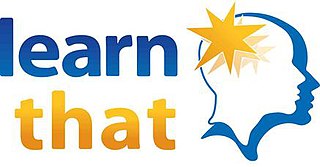
LearnThat Foundation is an American 501(c)3 nonprofit organization that develops and manages an online vocabulary and spelling program along with a free multimedia learners' dictionary, Open Dictionary of English (ODE). The foundation was founded in February 2004 under the name eSpindle Learning. In August 2010, the name was changed to LearnThat Foundation, and its domain was moved to www.LearnThat.org. The program is branded as LearnThatWord.
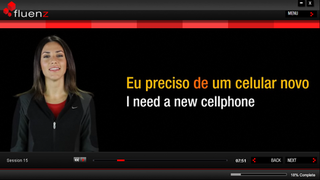
Fluenz is a digital language learning platform developed by Fluenz Inc., a U.S. entrepreneurial company. The interactive content can be downloadable or accessed online on computers and mobile devices. The product range consists of programs to learn Spanish as spoken in Latin America, Spanish as spoken in Spain, French, Italian, Mandarin, German, and Portuguese.

Lingua.ly was an EdTech startup that took a digital language immersion approach to teaching languages. The company was founded by Jan Ihmels and Orly Furhman, two academics from Cambridge and Stanford respectively. Lingua.ly operated under the freemium business model and existed as a Cloud-based web app and mobile app available for Android and iOS.

Cerego is a cloud-based adaptive learning technology platform that specializes in educational training technology. The platform is based on principles of neuroscience and cognitive science. Cerego's patented technology uses the scientific methods of distributed practice and the testing effect as the basis of user memory retention for content built in and available on their website.
Fresh Memory is a spaced repetition flashcard application, similar to SuperMemo.
A desirable difficulty is a learning task that requires a considerable but desirable amount of effort, thereby improving long-term performance. It is also described as a learning level achieved through a sequence of learning tasks and feedback that lead to enhanced learning and transfer.

Remember Me is an app for memorizing Bible verses. It utilizes gamification, flashcards and spaced repetition algorithms to optimize learning and retention. The application is available on Android, iOS, and as a web application.












